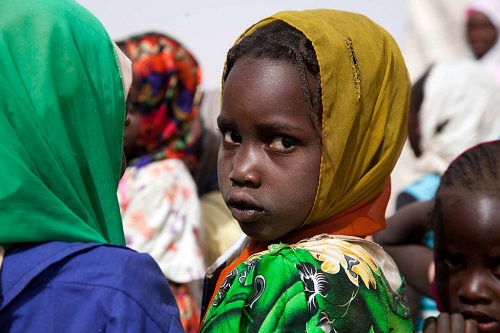UNAMID photo
By
OHCHR
States around the world must take effective action to end discrimination and gender-based violence faced by girls, say a group of UN rights experts. In a joint statement to mark International Day of the Girl Child, the experts say prompt action is needed so that girls can become full participants in all aspects of life. It is essential, they argue, to protect the progress already made and keep up the momentum for a world in which girls enjoy full equality:
“Harmful stereotypes and prejudices relating to age and gender too often hold girls back and place them in harm’s way. We must recognise the unique circumstances and challenges faced by girls everywhere and do more to ensure that their human rights are achieved, while empowering them to grow as active participants in communities and societies.
Through the Sustainable Development Goals, particularly Goal 1 (no poverty), Goal 4 (quality education), Goal 5 (gender equality), Goal 8 (decent work), and Goal 16 (peace and justice) the global community has committed itself to creating a world where girls can grow up free from discrimination and gender-based violence, where their gender and age will not be a barrier to equal opportunity and empowerment at all levels. However, these commitments continue to be unfulfilled, and there is a danger of regression, leaving too many girls behind.
All around the world, girls are denied equality in education, in health, in cultural life, in their families and in their communities, in ways that limit their choices and their opportunities. According to UNICEF, girls have lower literacy rates, receive less health care, and are more impoverished than boys.
Too many countries around the world maintain laws that discriminate against girls in matters like inheritance and the legal age of marriage. Too many families and communities persist in harmful practices like child marriage, menstrual seclusion and female genital mutilation.
Everywhere in the world girls are still too often subjected to gender-based violence and may become victims of trafficking and sexual exploitation as in forms of forced marriage, sexual slavery, prostitution, and forced pregnancy. In the contexts of conflict, post-conflict and humanitarian crisis situations, girls seeking to survive are often compelled to exchange sexual services and even “marry” for food, shelter, protection or safe passage.
Girls are often also expected to do more housework and to provide unpaid care for relatives. They may also be expected to work outside the home from a young age to support their families. When families find themselves in situations of need and hunger, girls are often the first to suffer. This early inequality within their family homes deprives girls of opportunities and puts them at a systematic disadvantage that continues throughout their lifetimes, limiting their access to food, to housing, to land, to education, to employment, and to the life that they would choose to craft for themselves.
Today, there are more girls in school than ever before, but one out of every five adolescent girls is still out of school. Too often, forced and/or early marriage or early pregnancy is a barrier to girls’ schooling. Girls must have full access to quality education, including to comprehensive education on sexuality and contraceptive information and services, in order to ensure their full development and to later facilitate their full access to employment and entrepreneurship opportunities.
Many of the challenges faced by girls are rooted in outdated and harmful perceptions about gender roles and what is ‘appropriate’ behaviour for young women, strongly influenced by patriarchal culture. Too often States misuse references to culture, religion, family and tradition in order to avoid fulfilling their human rights obligations to girls. Too often, girl survivors of trafficking, sexual slavery and other forms of sexual violence face discrimination and stigma from their families and wider community, which may make them vulnerable to being re-trafficked, further stalling their social inclusion. As States and the global community work to end these human rights violations, they should consider girls as agents and ensure that they participate actively in finding and implementing solutions.
Too often, girls face double discrimination that seeks to silence them and portray them as weak and powerless, but girls around the world are strong, brave, smart and capable. We must listen to what they have to say, give them opportunities to succeed, and must respect, protect and fulfil their human rights.”
OHCHR
The Office of the United Nations High Commissioner for Human Rights (OHCHR) represents the world’s commitment to universal ideals of human dignity. We have a unique mandate from the international community to promote and protect all human rights.



No Comments Yet!
You can be first to comment this post!